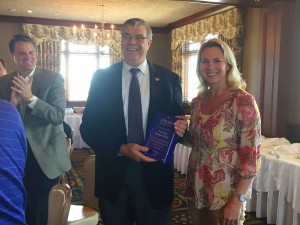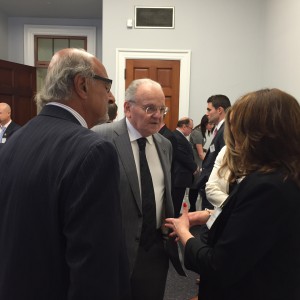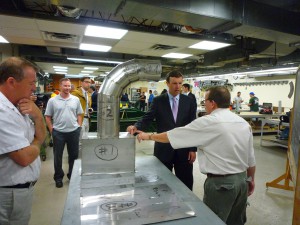The members of PILMA signed the following resolution concerning the importance of robust patent and intellectual property protections for promoting innovation and U.S. job creation.
Category: Recent News
PILMA Honors President Wise

At PILMA’s May 27th Trustee Meeting, the trustees unanimously approved a resolution honoring President Walter Wise for his outstanding leadership and thoughtful engagement while serving as Chairman of PILMA. Wise will retire as President of the Iron Workers International on July 1, 2015 and subsequently will step down from his chairmanship. On behalf of all the PILMA trustees, Jacqueline Kirby of AstraZeneca presented Wise with a commemorative award for his unwavering service.
SMART Highlights PILMA DGA Event
SMART Members’ Journal March/April 2015 edition highlighted the December 2014 PILMA event at the Democratic Governors Association’s conference in Beverly Hills, California which Local Union 105 attended.
“Following each new drug trial, research facilities must be wiped clean; entire systems must be changed, surfaces must be sterilized, and other equipment must be replaced. This requires highly skilled, reliable labor the industry can depend on to do the job right.”
Click here to read the full article as published in SMART Journal.
PILMA Partners with YourHealthCT
In December, PILMA passed a joint resolution concerning patients’ access to affordable health care and transparency in exchanges. Continuing to advocate for the principles adopted in that resolution, PILMA has been monitoring developments in the states and has signed on to YourHealthCT.
Click here to learn more about how YourHealthCT and ways to get involved.
Wise Requests Support for Eliminaing Barriers to Access and Transparency in Health Care Exchanges
PILMA Chairman and Iron Workers General President Walter Wise sent the following letter to state AFL-CIO presidents and Building Construction Trades state and local affiliates requesting support for principles adopted in the PILMA resolution concerning patients access to affordable health care and transparency in insurance market exchanges.
Click here to read the full letter or view it on LillyPad.
Life Sciences: Finding Cures, Creating Jobs

On March 19, 2015, PILMA participated in the DE, PA and NJ Life Sciences: Finding Cures, Creating Jobs event held at the Cannon House Office Building. The interactive display presentations showcased significant contributions that life sciences companies from Delaware, New Jersey and Pennsylvania make to global health, the local economy and workforces. PILMA
stood out among the participants due to its specific focus on job creation and connection to labor unions in the participating states.
Event sponsors included BioNJ, Delaware Bio, Health Care Institute of New Jersey, Pennsylvania Bio and We Work for Health. Other event participants included AstraZeneca, Celgene, Merck, Community Liver Alliance, New Jersey Association of Mental Health and Addiction Agencies (NJAMHAA) and PAREXEL.
PILMA & DGA: Creating Jobs and Economic Opportunity
The Pharmaceutical Industry Labor-Management Association (PILMA) and the California Biopharmaceutical Labor-Management Association (CBPILMA) hosted an event at the Democratic Governors Association’s conference in Beverly Hills highlighting how investing in high skilled labor supports 21st century pharmaceutical innovation.
The event featured remarks from California Building Trades President Robbie Hunter, Governor Steve Bullock (MT), Governor Maggie Hassan (NH), Pfizer’s Vice President of US Government Relations Julie Idelkope and PILMA Executive Director Tim Dickson. Local union members and apprentices from the IBEW, UA and SMWIA were in attendance demonstrating features of their state-of-the-art training modules.
View highlights from the event below:
Catalyst Blog: The Industry-Labor Partnership: Where Biopharmaceutical Innovation Meets Economic Advancement
Scott LaGanga, Senior Vice President of Public Affairs and Advocacy at PhRMA and a member of the PILMA Board of Trustees, wrote the following post for PhRMA’s Catalyst Blog on PILMA’s dedication to driving economic growth while promoting innovation.
Click here to read the full article.
Roche: Industry and Labor Are Back and Stronger Than Ever

David Roche, President of the Sheet Metal Workers International Association, Local 40 in Rocky Hill Connecticut, wrote the following op-ed published in the Connecticut Post spotlighting the PILMA alliance as a leading source of job creation in the state:
Like many sectors, construction suffered during the Great Recession. And it has taken time to recover. Even in 2012, only half the members of the group I represent, Local 40 of the Sheet Metal Workers International Association, were employed. Today, though, our workers are so in demand that we are actively recruiting students to our training centers. How did this happen? And how can we make sure that we continue to thrive?
The construction and pharmaceutical sectors may not seem like natural allies. One builds with mortar and the other with molecules. Nevertheless, I attribute our recent success in Connecticut in large part to construction projects awarded by the biopharmaceutical industry. These contracts have come about thanks to an alliance between labor unions and drug companies, formalized as the Pharmaceutical Industry Labor-Management Association (PILMA), through which we are dedicated to expanding economic growth, providing good jobs and leading medical breakthroughs.
The companies that comprise the biopharmaceutical industry in Connecticut have come to learn what we know: hiring union contractors makes good business sense because we can put the best trained, safest, most productive construction workers in the state on the job on their capital projects.
To our members, jobs are the bottom line. In the state of Connecticut, we are fortunate that policies such as those supported by Senators Chris Murphy and Richard Blumenthal create the environment in which industry can thrive. In 2011, over 58,000 jobs were supported directly and indirectly by the pharmaceutical industry and today there are even more. Continuous innovation means that new facilities must be renovated, rebuilt and reimagined. That’s where America’s building trades are called in.
There are over 1,600 building trades training centers located in every state in the United States. Here, our members learn the latest technology and cutting-edge techniques to be the highest skilled and best trained workers in the world. This means the pharmaceutical companies can rely on a ready pool of construction craft workers to equip their facilities in order to discover and manufacture new medicines and even cures. Of course, our members also benefit from a thriving pharmaceutical sector in the same way that millions of other Americans do. The skilled craft trades enjoy quality medical care throughout their careers and as a result are healthier into retirement. Within those walls that we built, scientists are finding vaccines against deadly diseases, treatments to manage chronic conditions, and therapies for cancer. New cures and treatments mean that once life-threatening conditions can be managed throughout our members lives, resulting in less costly hospital stays.
Biotechnology in turn benefits greatly from its partnership with labor. The sector has especially rigorous construction needs, requiring, for instance, that lab equipment be replaced after each new drug trial. Unions provide the best-trained and most safety-conscious workers in the state, men and women who can be trusted to handle these challenging jobs. In our interconnected economy, the effects reverberate outward. A healthy biotech sector is good for the construction trades. That adds up to two thriving sectors, which in turn boost the economy at large. And pharmaceutical companies are inventing drugs that will benefit people around the world. In a political environment marred by division and partisanship, in which labor and corporations are all too often at odds, our alliance is a rare success that we must nurture and protect.
David Roche is the president of the Sheet Metal Workers’ International Association, Local 40 in Rocky Hill.
Jobs for New Cures, a Labor-Industry Partnership
PILMA Chairman and Iron Workers General President Walter Wise highlighted the benefits of the labor-industry partnership in the following LillyPad guest post:
Click here to view it on the LillyPad website.
“For three years I have chaired the Pharmaceutical Industry Labor-Management Association (PILMA). It’s a coalition of labor unions and companies in the pharmaceutical industry who have joined forces to grow this important sector in our economy, create high-quality jobs, and promote medical innovations to cure disease.
While at first it may not be obvious what these two groups have in common, it is in fact fundamental. The belief in quality is what keep both thriving and competitive in our economy. Companies like Eli Lilly and Company see the value in working with the men and women in the skilled craft trades because they can count on us to do the job right the first time.
In developing the highest-quality medications and cures, state-of-the art facilities must be built and maintained up to scrupulous standards. The industry can’t afford any cross contamination from a leaky HVAC hood or loose piping when testing, developing and manufacturing medications. That’s where America’s Building Trades come in. They devote more than $1 billion each year to training their members at their 1,600 training facilities all over the country. It’s no exaggeration to say that these are the highest skilled and safest trained workers in the world.
In order to communicate the value of the partnership, PILMA organizes tours of building trades training facilities attended by pharmaceutical industry representatives and elected officials. It’s an eye opening experience for those unfamiliar with the rigor and detail of the work performed there.
“For the assignments they’re given – and the biopharmaceutical industry is a good illustration – they’ve got to be the best,” said Senator Dick Durbin following a tour of Chicago Pipefitters Local 597. “It isn’t just so that they produce a good product, it’s so that what comes at the end of the laboratory work and the production work does the thing it’s supposed to do – keep America healthy and safe.”
The men and women of America’s Building Trades are also lifelong patients. With close ties to the pharmaceutical industry, they receive quality healthcare throughout their lives and into retirement. Access to experienced providers and affordable medicines allow workers to stay on the job longer and do what they came to do.
PILMA is a snapshot of how high-quality labor is a necessity for high-quality products. The promise of good jobs allows the Building Trades to invest in training their workers and in return the pharmaceutical industry benefits from cutting edge technology and techniques for equipping their facilities. Without the promise on both sides new medications and lifesaving cures would not be possible.”

